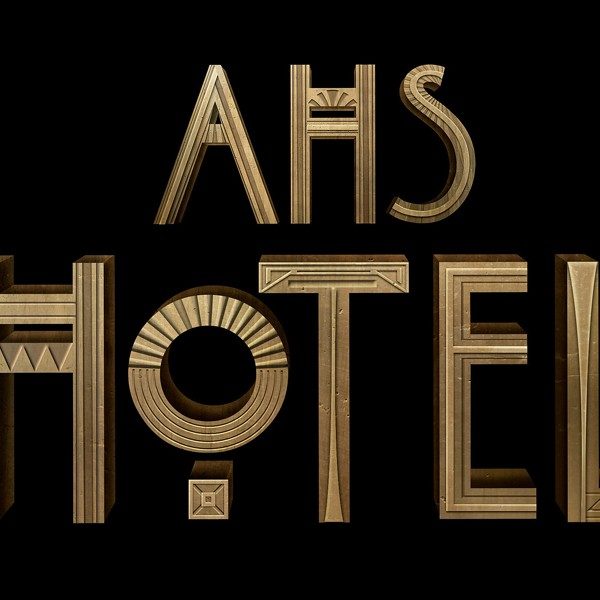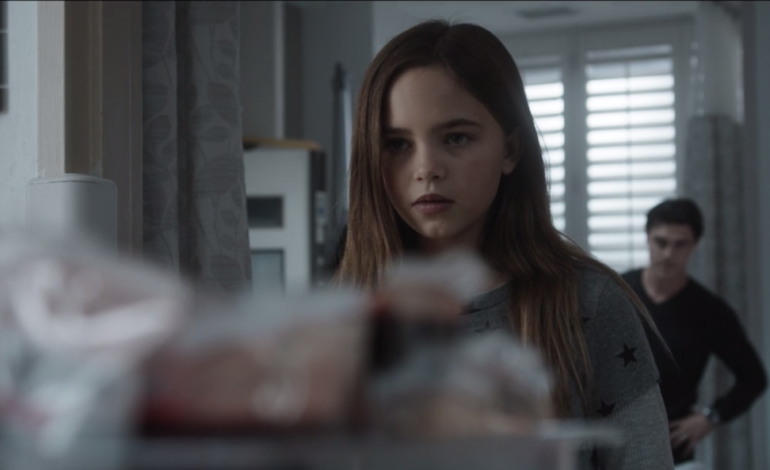

Is it legal to imply that Quentin Tarantino murders people to drink their blood? Because, if not, this episode of American Horror Story has a lot of explaining to do. Overall, this episode played out as could be expected, though it was still interesting enough to sit through and watch play out despite its predictability.
In this episode, Harry (Finn Wittrock, Ratched) tries to justify his lack of parenting skills or common sense by emphasizing how bad of a dad he was to Alma before the events of the season, even though he only started to be terrible to her when the pill affected his perception; regardless of his prior parenting skills, being beholden to the demands of a nine-year-old show’s lack of any true moral backbone.
It’s one thing to treat your child with respect and dignify their opinions and perceptions, and it’s another to be unable to say no when your nine-year-old holds her hand out for drugs because you took one yourself. Honestly, what’s she going to do, stab you? Probably, because that’s exactly what she did to Chief Burleson (Adina Porter, The 100) at the end of the episode, but you’re also bigger than her and she can’t reach the top shelf. Stick all the potential murder weapons and the vampire pill at the very top of the highest shelf in the kitchen and all you’re left with is a tantrum instead of a crime scene.
To give some credit to Harry, Alma (Ryan Kiera Armstrong, Anne with an E) is definitely a force to be reckoned with. At nine years old, she hasn’t yet developed a true sense of empathy, and she was already set up to have some interesting—read: potentially concerning—personality traits and perspectives that, for others, her age, are merely noted to reference in the future when she’s more developed. However, because Alma has taken the pill and indoctrinated herself into Harry’s new world of self-important rationalization, all her fixations on being the best, her age-typical incomprehension of consequences, and her age-understandable-though-not-common disinterest of the greater world outside of herself as a concept have been validated and exponentially increased which makes her the most volatile and dangerous character in the show.
The horror trope of the evil child is not only unnerving due to the juxtaposition between the societal perception of youth and its innocent with evil reserved for the dark recesses of mature age, but also because children don’t have the same mental capacity and understanding when it comes to nuanced human emotion and experiences. When one child makes another cry, they beg them to stop crying not necessarily because they feel bad, but because they don’t want to get in trouble, that’s the whole point of discipline, it’s for the child to begin to develop an understanding of right and wrong despite what their instincts may tell them so they’ll know how to behave until all the puzzle pieces begin to fit.
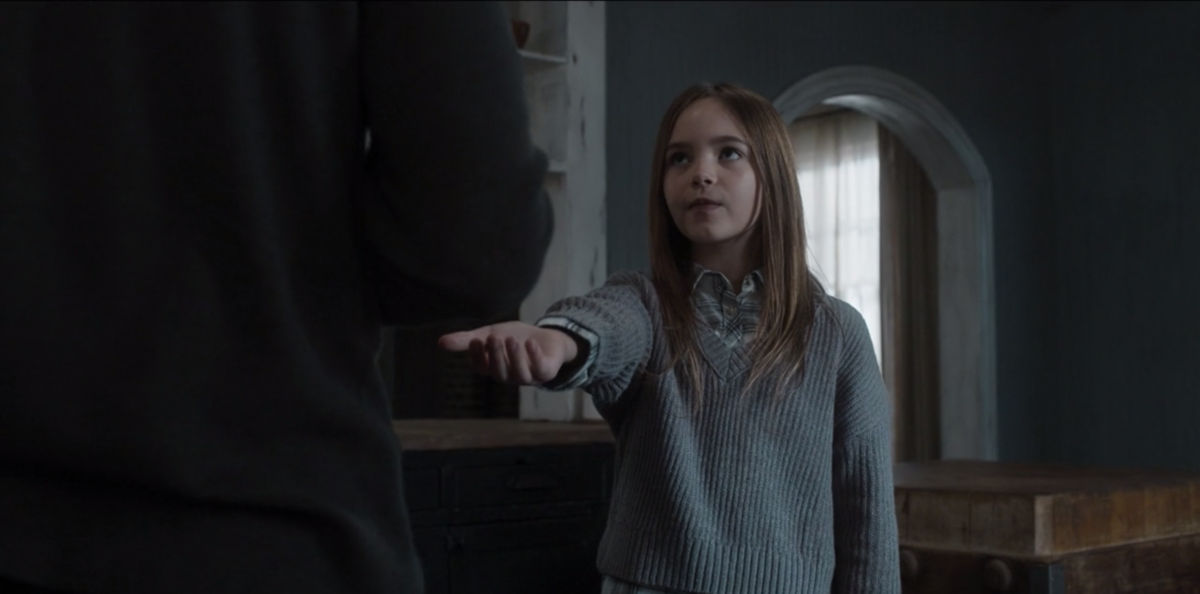

Alma’s character power comes from the latter reason, the audience’s knowledge that this child is already aloof by nature fuels the tension and fear knowing that, instead of just being a creepy kid who will probably grow out of most of her God-complex with time, the side effects of the pill will only increase all the destructive and toxic perceptions she has of the rest of the world.
The episode conveyed this perfectly when Alma and Harry were driving in the car and negotiating her use of the pill—because Harry thinks being a good father means not saying no when his daughter is doing the same drugs he is, despite hypocrisy in the name of protection is far better than enabling child drug use. Alma says that if the rest of the world were to disappear, she wouldn’t care, and Harry agrees, which—while concerning—isn’t far off from the general mindset that all the vampires thus far have had. However, Alma takes it a step further and tells Harry they should just ditch Doris (Lily Rabe, The First Lady) because she’s not special like them, and Harry, understandably, is horrified and asserts that Doris is the best mother and wife—which she is—and they should love and cherish her.
While this is also an example of actual parenting and the whole point of communication with children when they have yet to grasp a concept, this also emphasizes two aspects about Harry and Alma’s characters. So far, Harry has justified his killings by going after people that he thinks are inferior and won’t be missed, that aren’t doing the world any good, and he even refers to the pale people with the same amount of contempt. However, despite Alma’s insinuations that Doris is untalented, Harry’s emotional attachment to Doris stops him from lumping her in with the others that he dehumanizes into concepts to justify his actions. While this is also yet another double standard in relation to the parallel of drug abuse and vampirism, this is a foil to Alma to emphasize how her youth makes her as dangerous as she is talented; she doesn’t need to struggle to rationalize her actions because she doesn’t perceive the consequences so long as an authority figure validates her, her need for blood superseding any and all other rational thought.
In short, Harry’s failure as a parent—which did not begin prior to the season like everyone wants to claim, but rather truly manifested as a problem when he took the first pill—created a monster that rivals Austin (Evan Peters, The Mare of Easttown) and Belle (Frances Conroy, Joker); while the latter are more sinister as people, able to ruthlessly rationalize their actions in the name of personal success, this behavior is second nature to Alma as she doesn’t perceive the potential repercussions that come from her killing people, which makes her all the more dangerous than those who have to do careful planning to avoid getting caught.
Although Alma was one of the main catalysts and strong points of the episode and has once again set up even higher stakes moving forward, the most interesting aspect of this episode is, arguably, Mickey (Macaulay Culkin, Home Alone) and all the commentary his plotline makes.
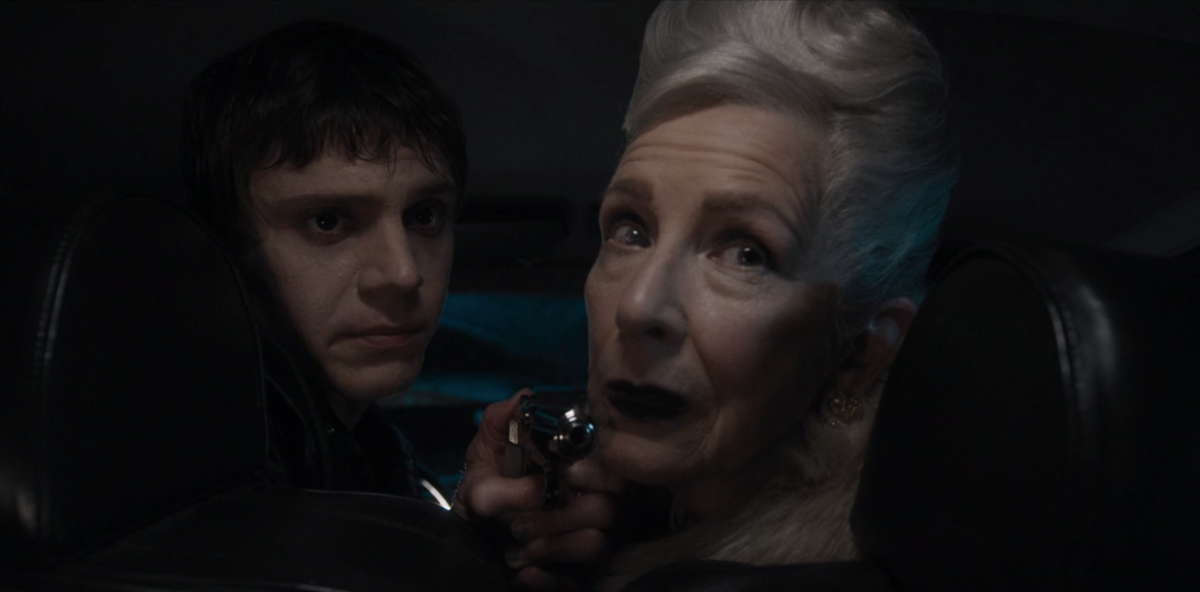

As seen in the previous episode, Mickey does truly have talent, and while he did resign himself to a life of murder in the name of success, not much else changed in terms of his personality and how others treated him, which is the most critical point of note. While also an indication of her elitism and lack of any real humanity, Belle’s comment that Mickey isn’t one of them despite having taken the pill does actually hold merit in the technical sense; still not valid, but she’s not wrong.
Despite the mental changes the pill gave Mickey, everything is still the same. His ego hasn’t grown to planet-sized proportions the way all the others have, and he is still treated with contempt and walked upon solely for existing. Even his murder attempt doesn’t go as planned due to the sex worker’s perception of him to begin with.
This depicts the double standards that come with the perception of talent and success, people believing that it only takes hard work, perseverance, and a natural affinity to be a successful artist. Instead, this sheds light on how class and other outside factors influence whether people achieve success in their chosen field. In the film and television industry, it’s always about who you know, not what you know.
There’s also the disconnect in regards to tortured artists and artists who do destructive things in order to “get inspired.” A rich and famous person becoming addicted to drugs is very different than an average, even poor person becoming addicted to drugs, and Mickey is on the latter half of the spectrum but has been fed the lies of those on top that all they did was work hard and have talent, but all those who had managed to afford and survive the pill were already in more comfortable and/or stable positions than Mickey.
He’s perceived to be of low moral character due to his drug addiction—which is a medical sickness—and his being a sex worker, despite sex work being real work and people needing to eat in a world that already condemns the poor.
However, despite the condemnation, there is also the romanticization of the poor and lower-class struggle factored into this which also parallels with the exploitation of those without the means to say no. When Belle visits Mickey’s home she laments about how horrible it is and how she’s written stories about people living in hovels and other terrible situations in order to make a story more compelling, but in the same breath says Mickey’s poverty offends her and makes demands of him to get blood for her because he doesn’t have the power to say no, which was also shown in the first episode when she demanded to drink his blood.
Speaking of exploitation, this plotline finds a catalyst in Ursula (Leslie Grossman, Love, Victor) who, while already introduced previously, makes her true debut in this episode, much to the chagrin of everyone in town.
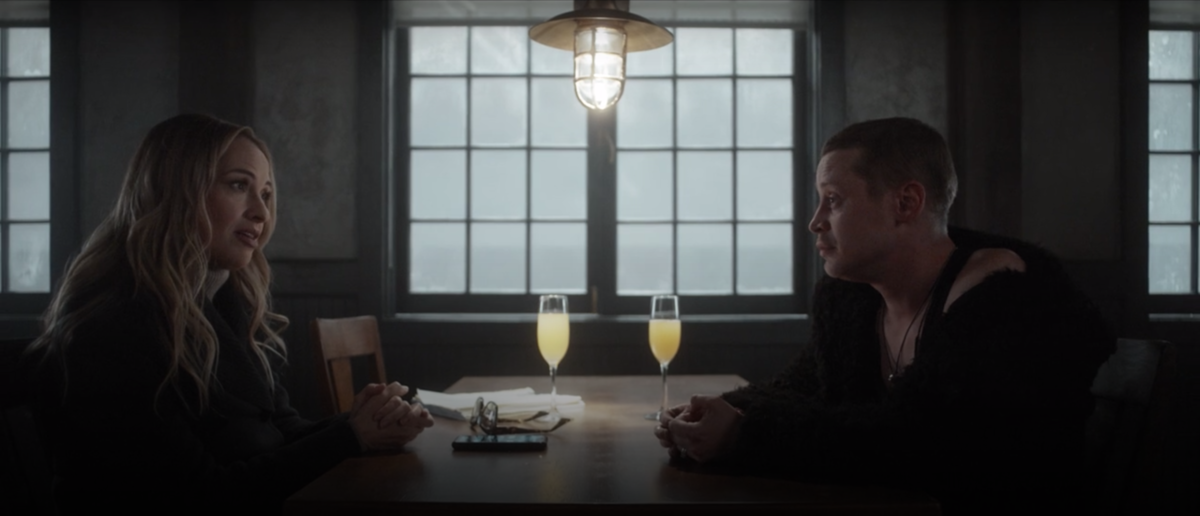

Ursula as a character was far more insufferable in person as she was over the phone, and she wasn’t even interesting for it. She’s a talent agent from Los Angeles, she works in an industry that hinges on having a good personality and being easy to work with. Instead of a balance between professionalism and ambition, her character is just built from ambition and has no interpersonal skills at all.
She loudly bemoans Austin and Belle’s singing and insults them to their faces; while everyone is entitled to their own emotions and opinions, if she had any mental capacities at all she would just put in her AirPods and keep her mouth shut. She also degrades Mickey when he speaks to her, and it’s one thing to be curt to a stranger to avoid them getting the wrong idea—women have to finesse that all the time—but rather Ursula leans into her verbal attack and uses his line of work and drug addiction as an indicator of moral character.
Mickey chose the wrong agent to involve himself with because it’s a true wonder how she still has a career in the industry; yet at the same time, he doesn’t have the choice to be picky nor does he have the power to demand even the bare minimum of respect from this woman as no one has ever granted it to him and she takes full advantage of that.
She meets with Mickey and tells him that there’s no way he’s that talented because he’s a poor sex worker with opioid addiction and the poor man sits there and accepts the verbal assault because at least she’s listening to him. She even rattles off names of other screenwriters who started out as drug addicts and says they’re the exception, which calls to the double standard and romanticizing of drug abuse and poverty by those who have never actually had to experience it before.
She exploits Mickey’s dream of success—which is honestly not even success but just comfort and basic respect—and forces him into dangerous situations to get what she wants, all the while probably not even being truthful about her promises because she knows that she has all the power over him.
What makes Ursula interesting and, arguably, more of a monster than the vampires can be deduced through the parallel between vampirism and drug abuse.
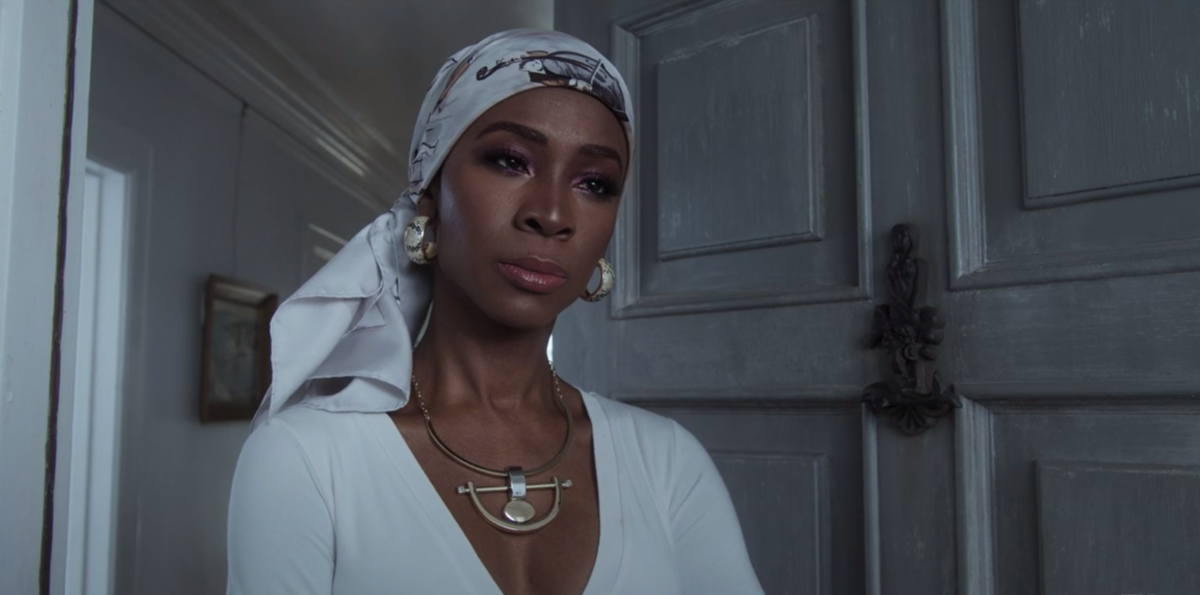

While not much is known about The Chemist (Angelica Ross, Pose), it was already known that the little black pill was born of the opioid epidemic and experimentation when creating drugs. This episode reveals her to be a well-off woman who wants a quiet life and can easily command Austin and Belle to kill whomever she wants in order for her to keep giving them the pill.
This dynamic of Austin and Belle being beholden to the whims of The Chemist adds a new layer to the overall hierarchy that has been previously established. While they act and are perceived to be elite, they are actually parallel to TB Karen (Sarah Paulson, Ratched) who’s dependence on crystal meth leads her to kidnap babies to feed to Belle. While crystal meth addiction is a medical sickness and Belle has stated they only take the pills in the winter, Harry’s own reasoning for taking the pill—creating content in order to financially provide for his family—can be paralleled to the body’s physical need to continue taking the drugs, as these artists need the pills, though they apparently already have talent in their own right and are also very rich.
Regardless, Belle and Austin are merely well-off users and distributors while The Chemist is the true brains behind the pill itself, though separate from the operation. As for Mickey and Harry, they’re both also users but they don’t have direct access to the source the way that Belle and Austin do, which gives the latter two more power over the others, but they all need the pill and need to keep taking the pill, for a variety of personal reasons.
Alma is also a user, but she’s interesting as she doesn’t actually have a reason to take it. She took it to be successful at playing her music, but her need wasn’t connected to any financial aspirations or larger goals of grandeur that can be achieved relatively soon; rather, she took it at age nine and plans to take it for the rest of her life just because she wants to play music. There’s no justification or rationalization other than pure personal growth, which is part of Harry’s initial argument to her; an argument he doesn’t put up much of a fight for, unfortunately.
While the parallels aren’t perfect matches, Alma symbolizes the surge in youth drug use and how vaping has gone from a way to wane off tobacco and instead has become a gateway drug for teenagers. She does it because it’s fun and it makes her feel good, which is very different than the need that people feel when they’re addicted to a substance; to clarify, the addiction is paralleled with the personal reasons that the individuals need to take the pill (i.e. Harry needs to make money to provide for his family, so he needs to take the pill in order to do so and he can’t stop or else they won’t make money, which is equivalent to withdrawals and other symptoms.)
Ursula, however, does not take the pill. She doesn’t feel the same pull to take it the way Harry did when the words weren’t coming and he needed to write his script, or even the want to take it the way Alma does. If these were mainstream drugs, she doesn’t have a dependency on them nor does she take them for fun.
Ursula, rather, wants to be part of the operation for the sole purpose of exploiting people for profit. Her goal is for The Chemist to give her unlimited access to the pills so she can give them to the writers she represents and they can reap the financial rewards. She believes she can monopolize the talent agency world by being the distributor of the pills—although, with the implication that Quentin Tarantino also takes the pills, the question does become whether someone has already taken advantage of this market.
Either way, her entire fixation is on how she can exploit people’s dependency. If placed in the parallel with drug abuse, she would provide users with the drugs in exchange for her reaping the benefits of their subsequent actions. An analogy could be made to The First Purge (2018) where the scientists running the social experiment preyed upon lower-income communities to convince them to be a part of it and commit murder.
When compared to The Chemist, Ursula’s actions are far more heinous as it’s one thing to create a substance, it’s another to knowingly get people dependent on said substance for selfish reasons that are indifferent to the other person’s well-being; if they succeed, that’s a great bonus, if they don’t, she’ll just find someone else.
In the end, this plotline has only just begun and it will be interesting to see where things go. Previously, it was speculated that there could be potential corruption in the police department, that Chief Burleson was in on the situation and had an understanding with the town vampires. That didn’t seem to be the case, more like she had a suspicion but didn’t have all the facts, though now she’s dead so there’s not much else she can do, though she did make a great point to Alma about how people are still people, as well as an interesting concept about “the enemy,” as it can be argued that she is Alma’s enemy; the perception of allies and enemies in this morally grey system will be interesting if continued to be explored.
Overall, the end wasn’t too surprising, the setup made things clear long before they actually played out, and all that’s left is to wait and wonder what will happen next until episode four.
Rating: 8/10

